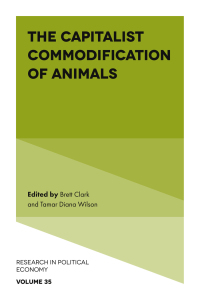Buy The Capitalist Commodification of Animals 1st Edition PDF ebook by author Brett Clark; Tamar Diana Wilson – published by Emerald Publishing Limited in 2021 and save up to 80% compared to the print version of this textbook. With PDF version of this textbook, not only save you money, you can also highlight, add text, underline add post-it notes, bookmarks to pages, instantly search for the major terms or chapter titles, etc.
You can search our site for other versions of the The Capitalist Commodification of Animals 1st Edition PDF ebook. You can also search for others PDF ebooks from publisher Emerald Publishing Limited, as well as from your favorite authors. We have thousands of online textbooks and course materials (mostly in PDF) that you can download immediately after purchase.
Note: e-textBooks do not come with access codes, CDs/DVDs, workbooks, and other supplemental items.
eBook Details:
Full title: The Capitalist Commodification of Animals 1st Edition
Edition: 1st
Copyright year: 2021
Publisher: Emerald Publishing Limited
Author: Brett Clark; Tamar Diana Wilson
ISBN: 9781839826818, 9781789733655
Format: PDF
Description of The Capitalist Commodification of Animals 1st Edition:
From the Indigenous perspective, sustainability must be understood as a means of survival. In a climate of in-migration, clan and tribal communities have been forced to build sustainable solutions together to protect their sovereignty, recognition and mutual respect. In the midst of a global pandemic that threatens the economic and social well-being of millions of people, this edited collection addresses the social, economic, and environmental sustainability of tribes, clans, and Indigenous cultures across national and global origins. Acknowledging that these peoples around the globe have addressed threats to their survival for millennia, the authors showcase examples of indigenous groups spanning South Africa, Nigeria, Australia, New Zealand, Pakistan, Afghanistan, Bolivia and North America. Regional examples also come from Rwanda, Cameroon, Congo, Ethiopia, East Timor, Papua New Guinea, the Andaman and Nicobar Islands, Easter Island, and Nunavit, Canada. Breaking fresh ground by shining a light on sustainability journeys from outside the global mainstream, this book demonstrates how sustainable recovery and development occurs in respectful collaboration between equals.





